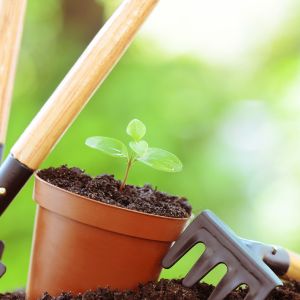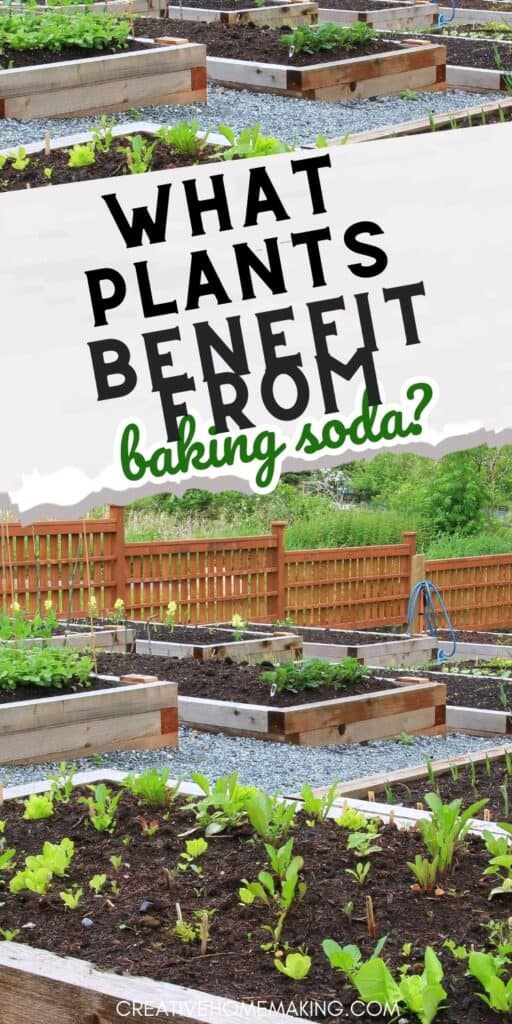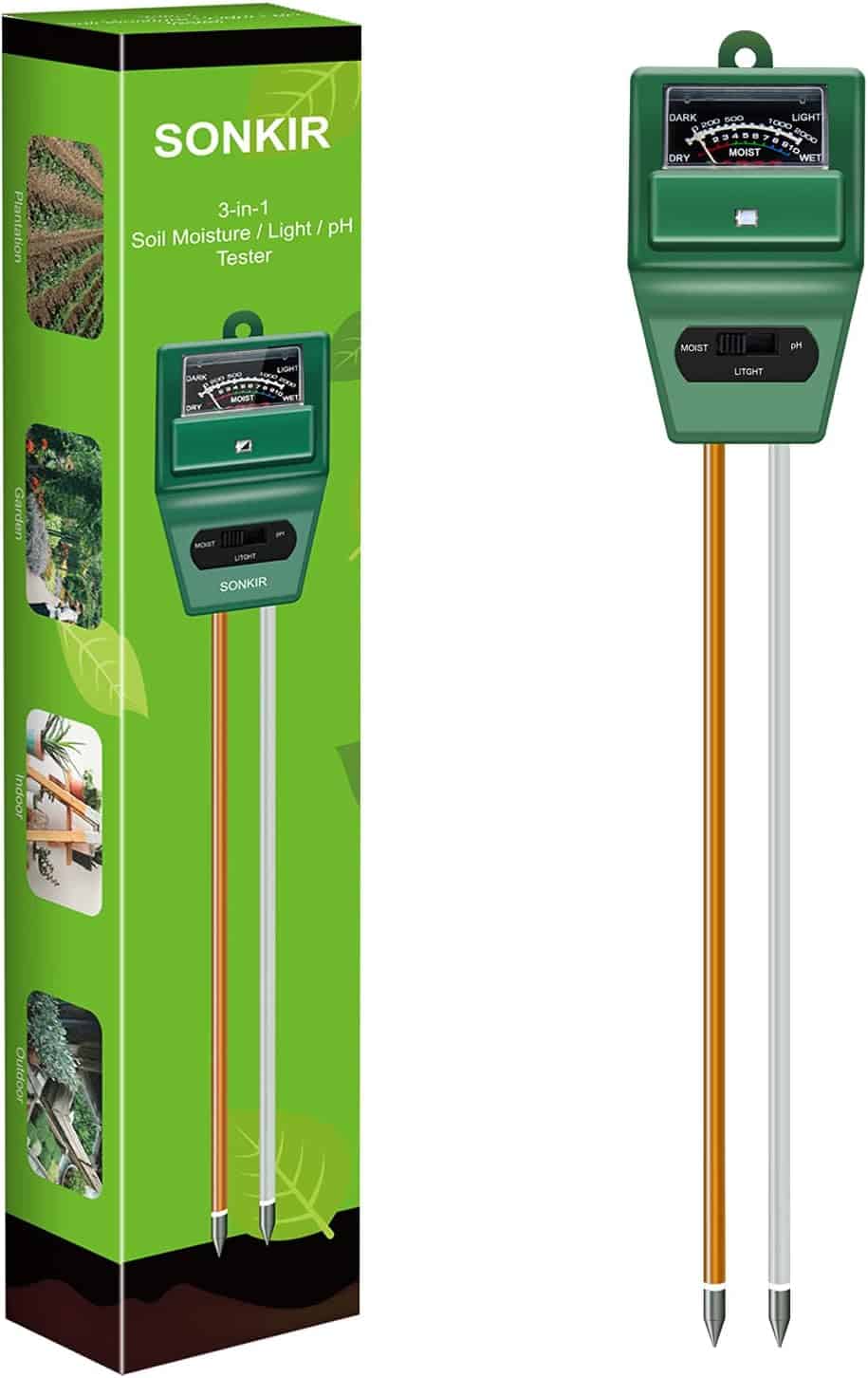Wondering what plants benefit from baking soda? If you’re looking for a natural and cost-effective way to improve the health and growth of your plants, baking soda might be the solution you need. Baking soda, also known as sodium bicarbonate, is a versatile household item that has numerous benefits when it comes to gardening.
This post may contain affiliate links.
Using baking soda in your garden can help you tackle a variety of common problems that plants face, such as fungal infections, pests, and poor growth. By adding baking soda to your soil or using it as a foliar spray, you can help your plants thrive and stay healthy. Plus, baking soda is an eco-friendly and non-toxic alternative to many commercial products that can harm the environment and your plants.
Whether you’re an experienced gardener or just starting out, learning about the benefits of baking soda can help you take your gardening game to the next level. In this article, we’ll explore some of the plants that benefit from baking soda and how you can use it to improve your garden. From tomatoes to roses, you’ll discover how baking soda can help your plants grow stronger and healthier.
Related Article: Homemade Bugspray for Plants with Dawn: A Natural Solution
Understanding Baking Soda and Its Properties
Chemical Composition of Baking Soda
Baking soda, also known as sodium bicarbonate, is a chemical compound that consists of sodium, hydrogen, carbon, and oxygen atoms. Its chemical formula is NaHCO3, which means it contains one sodium (Na) atom, one hydrogen (H) atom, one carbon (C) atom, and three oxygen (O) atoms.
Alkaline Properties of Baking Soda
Baking soda is known for its alkaline properties, which means it has a pH greater than 7. A 1 percent molar solution of baking soda in water at room temperature has a pH of 8.3. This number indicates that baking soda is alkaline, which accounts for its bitter taste.
When baking soda is mixed with an acid, such as vinegar, it creates a chemical reaction that produces carbon dioxide gas. This reaction causes the mixture to bubble and fizz, which is useful for cleaning and cooking purposes.
Related Article: When to Cut Back Azaleas for Optimal Growth and Blooming
In gardening, baking soda can be used to adjust the pH level of soil. If your soil is too acidic, adding baking soda can help neutralize it and make it more alkaline. However, it is important to use baking soda in moderation, as too much can harm your plants.
Overall, baking soda is a versatile compound that has many uses in cooking, cleaning, and gardening. Understanding its chemical composition and alkaline properties can help you use it effectively and safely.
Baking Soda in Gardening
Baking Soda as a Fertilizer
A good source of sodium, an essential nutrient for plant growth, baking soda is a great natural fertilizer for plants. Baking soda can also help to improve the texture of the soil and make it more conducive to plant growth.
To use baking soda as a fertilizer, sprinkle a small amount around the base of your plants. Be careful not to use too much, as it can raise the pH level of the soil.
Baking Soda for Soil pH Control
Baking soda can be used to control the pH level of your soil. If your soil is too acidic, adding baking soda can help to raise the pH level and make it more alkaline. This is especially useful for plants that prefer alkaline soil, such as hydrangeas and lilacs.
.
To use baking soda for soil pH control, mix 1 tablespoon of baking soda with 1 gallon of water. Apply the mixture to your garden beds or directly to the soil around your plants. Don’t know the pH level of your soil? You can easily measure the pH level of your soil with this inexpensive pH level soil testing kit.
Soil pH Meter, MS02 3-in-1 Soil Moisture/Light/pH Tester Gardening Tool Kits for Plant Care
Baking Soda as a Weed Killer
Baking soda can also be used as a natural weed killer. It works by drying out the leaves of the weeds, causing them to wither and die.
To use baking soda as a weed killer, mix 1 tablespoon of baking soda with 1 gallon of water. Add a few drops of dish soap and mix well. Spray the mixture directly onto the leaves of the weeds, being careful not to get any on your plants.
Related Article: Using Epsom Salt to Fertilize Houseplants
While baking soda can be effective at killing weeds, it is not a selective herbicide and can harm other plants as well. Use it carefully and only on the weeds you want to get rid of.
Baking soda is just one of many natural fertilizers and soil amendments that can be used in gardening. Other options include epsom salt, coffee grounds, and various commercial fertilizers. When using any fertilizer or soil amendment, it is important to pay attention to the pH levels of your soil and adjust accordingly.
Baking Soda for Plant Diseases and Pests
If you’re looking for a natural and effective way to keep your plants healthy and pest-free, baking soda may be the answer. Baking soda has been used for centuries as a natural remedy for various ailments, including plant diseases and pests. In this section, we will discuss how baking soda can help your plants fight off fungal diseases and pests.
Baking Soda for Fungal Diseases
Fungal diseases such as powdery mildew, black spot fungus, and early blight can wreak havoc on your plants. Fortunately, baking soda can help prevent and control these diseases. Baking soda works by disrupting the fungal spores and preventing them from germinating. To make a baking soda spray, mix 1 tablespoon of baking soda, 1 tablespoon of horticultural oil, and 1 tablespoon of liquid soap in 1 gallon of water. Spray the solution on the affected plants every 7 to 14 days, or as needed.
Related Article: How to Make Hydrangeas Blue: Tips and Tricks for Achieving Vibrant Blue Blooms
Baking Soda for Pest Control
Baking soda can also be used to control pests such as aphids, snails, cabbage worms, and spider mites. It works by disrupting the insects’ exoskeleton and causing them to dehydrate and die. To make a baking soda spray for pests, mix 1 tablespoon of baking soda, 1 tablespoon of liquid soap, and 1 gallon of water. Spray the solution on the affected plants, making sure to cover both the tops and bottoms of the leaves.
Related Article: Using Epsom Salt as a Natural Fertilizer in the Garden
It’s important to note that while baking soda is a natural and effective pesticide, it can also harm beneficial insects such as ladybugs and bees. Use baking soda sprays sparingly and only when necessary. Additionally, baking soda can cause foliar burn if applied in high concentrations or in hot weather. To avoid foliar burn, test the spray on a small area of the plant before applying it to the entire plant.
In summary, baking soda can be a useful tool in the fight against plant diseases and pests. It can be used as a natural fungicide to prevent and control fungal infections, and as a natural pesticide to control a variety of pests. Just make sure to use it sparingly and with caution, and always test the spray on a small area of the plant before applying it to the entire plant.
Baking Soda for Specific Plants
If you’re wondering which plants benefit from baking soda, you’ve come to the right place. Baking soda, or sodium bicarbonate, can be used to enhance the health and growth of various plants. In this section, we’ll explore how baking soda can benefit specific plants, including tomatoes, flowers, roses, and vegetables.
Baking Soda for Tomatoes
Tomatoes are a popular fruit that many gardeners love to grow. However, they can be susceptible to certain diseases and pests, such as tomato plant leaf spot, crabgrass, and slugs. Baking soda can help prevent these issues and keep your tomato plants healthy.
To use baking soda on your tomato plants, mix 1 tablespoon of baking soda with 1 gallon of water. Spray the solution onto the leaves of your tomato plants, making sure to cover both the top and bottom of the leaves. This can help prevent tomato plant leaf spot and other fungal diseases.
Related Article: How to Bring Back a Dead Blueberry Plant: Tips and Tricks
Baking Soda for Flowers
Cut flowers and houseplants can also benefit from the use of baking soda. Baking soda can help keep flowers fresh and prevent them from wilting too quickly. To use baking soda on your flowers, simply add a pinch of baking soda to the water in your vase.
Baking Soda for Roses
Roses are another popular plant that can benefit from baking soda. Baking soda can help prevent powdery mildew, a fungal disease that can affect roses. To use baking soda on your roses, mix 1 tablespoon of baking soda with 1 gallon of water. Spray the solution onto the leaves of your roses, making sure to cover both the top and bottom of the leaves.
Related Article: The Best Homemade Fertilizer for Flowering Plants
Baking Soda for Vegetables
Vegetables, including cucumbers, broccoli, and squash, can also benefit from the use of baking soda. Baking soda can help balance the pH of acidic soil, which can be beneficial for vegetable plants. To use baking soda in your vegetable garden, mix 1 tablespoon of baking soda with 1 gallon of water. Spray the solution onto the leaves of your vegetable plants, making sure to cover both the top and bottom of the leaves.
Cautionary Measures with Baking Soda
When using baking soda on your plants, it is essential to take some precautions to avoid any potential risks. Although baking soda is generally safe to use, it can be harmful to plants, pets, and children if not used correctly. Here are some things you need to consider before using baking soda on your plants:
Potential Risks for Plants
While baking soda is an effective fungicide, it can also cause defoliation and damage to some plants. Azaleas and rhododendrons are particularly sensitive to baking soda and can suffer from leaf burn and other issues if exposed to high concentrations of baking soda. Additionally, baking soda can interfere with the uptake of essential nutrients like manganese, calcium, and aluminum, which can lead to nutrient deficiencies in your plants.
Safety for Pets and Children
Baking soda is generally safe for pets and children, but it can be harmful if ingested in large quantities. Keep your pets and children away from areas treated with baking soda, and make sure they do not accidentally ingest it. If you are using baking soda in your garden, consider fencing off the treated area to prevent your pets and children from coming into contact with it.
Impact on Pollinators and Birds
Baking soda can also have an impact on pollinators and birds. While baking soda is not toxic to birds or bees, it can interfere with the pH balance of the soil and create an alkaline environment that is not suitable for some plants. Additionally, baking soda can also reduce the effectiveness of natural pest control methods like neem oil and aspirin.
To minimize the risks associated with using baking soda on your plants, it is essential to follow the instructions carefully and use it sparingly. Avoid using baking soda on sensitive plants like azaleas and rhododendrons, and make sure you do not apply it directly to the leaves of your plants. If you have any concerns about using baking soda on your plants, consult a professional gardener or horticulturist for advice.
Related Article: How to Kill Squash Bugs
Frequently Asked Questions
What are the benefits of using baking soda on plants?
Baking soda is a natural and affordable way to maintain healthy plants. It can help balance the pH levels of the soil, which is essential for optimal plant growth. Baking soda can also act as a natural fungicide, preventing diseases such as powdery mildew and damping off. Additionally, it can repel pests such as aphids and spider mites, making it an effective and safe alternative to chemical pesticides.
Can baking soda be harmful to certain plants?
While baking soda is generally safe to use on most plants, some plants may be more sensitive to the alkaline nature of baking soda. Plants that prefer acidic soil, such as blueberries and azaleas, may not benefit from baking soda. It is important to research the specific needs of your plants before using baking soda on them.
How should I apply baking soda to my plants?
To apply baking soda to your plants, mix one tablespoon of baking soda with one gallon of water. Pour the mixture into a spray bottle and spray it onto the leaves of your plants. It is important to avoid spraying the mixture on the soil, as this can disrupt the pH balance. You can also sprinkle a small amount of baking soda directly onto the soil around your plants.
What other natural ingredients can I mix with baking soda for my plants?
Baking soda can be mixed with other natural ingredients to create a potent plant treatment. For example, mixing baking soda with vegetable oil and dish soap can create an effective insecticide. Adding vinegar to the mixture can also enhance its fungicidal properties. However, it is important to research the specific needs of your plants before using any natural treatment.
Are there any plants that should not be treated with baking soda?
Plants that prefer acidic soil, such as blueberries and azaleas, may not benefit from baking soda. Additionally, plants with delicate leaves, such as ferns and succulents, may be more sensitive to the alkaline nature of baking soda. It is important to research the specific needs of your plants before using baking soda on them.
What are some common mistakes to avoid when using baking soda on plants?
One common mistake when using baking soda on plants is overuse. It is important to only use baking soda as needed, as excessive use can disrupt the pH balance of the soil. Additionally, it is important to avoid spraying the mixture on the soil, as this can disrupt the pH balance. Finally, it is important to research the specific needs of your plants before using baking soda on them.




